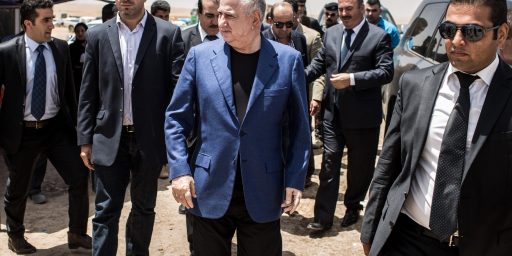Rethinking Chalabi
Ralph Peters thinks we may have backed the wrong horse in Iraq.
Unless we have a run of very good luck, we are apt to pay dearly for our attempt to stage our occupation on the cheap. We needed to impose a full-scale military government on Iraq – while working from the start toward elections.
Instead, we listened to liars – such as Ahmed Chalabi – who told the administration just what it wanted to hear. We created a political hermaphrodite, the Iraqi Governing Council, to empower men who had no support in Iraq until we handed them authority – and who still couldn’t win an election for dogcatcher in a country without dogs.
We didn’t create a transitional body. We created a junta-in-waiting. We may be shocked to learn one day who on the Governing Council has been cutting quiet deals with indigenous extremists. One thing is already as clear as a desert sky: The exiles we empowered are determined to rule Iraq, whatever the cost.
To be fair, the council also includes genuine popular leaders – such as its Kurdish members – who remained in Iraq and fought Saddam. Such men could win regional elections overwhelmingly, were they held tomorrow. But the exiles, exemplified by Chalabi, are determined to rig the system so they win, too.
***
We can’t predict exactly what will happen in Iraq. The Iraqis themselves don’t know. The possibilities range from muddling-through to civil war. Yet reasons remain to be hopeful, despite our mistakes.
Iraq is already a far better place than it was. Our soldiers continue to do remarkable work. The terrorists, foreign and domestic, have given up on dislodging our forces and focus on disrupting the transfer of power. Above all, the people of Iraq want better lives for themselves and their children. Most will work toward that end.
We need to reassess our support for Chalabi & Co. They’re not our only hope. And they’re certainly not Iraq’s best hope. We need to give democracy an honest chance – even if we don’t like the initial results – and not allow tomorrow’s Iraq to be ruled by a junta behind a façade of elections.
Interesting. I’m not sure what our options were, though. The advantage of a team of exiles is that we could be sure they weren’t Saddam loyalists and could work with them in advance. I’m unconvinced that Sistani could have been brought into anything under Coalition aegis. Would having the U.S. running Iraq directly and promising to hold elections at some point down the road been satisfying to anyone?



Before evaluating Peters’s opinion, I’d want to know what he thought of Chalabi beforehand. Chalabi was somewhat controversial with State even before he got the ear of the coalition.
-But isn’t everything controversial at State?
Peters does make some points but it sorta strikes me a Monday morning quarterbacking to me. It’s not like we have any guarantees either way.
My one problem with Peters is that he axiomatically denigrates anything that comes from Chalabi or Rumsfeld. It seems he has a visceral hatred for Rumsfeld, and he’s bought into the whole ‘this war was conducted on the cheap!’ meme without even pausing to question it.
That said, on most other topics he’s pretty rational and makes sense.
This is certainly the heart of the problem, isn’t it? Take me, for example. I think the only way to make postwar Iraq turn out right would have been to impose a fairly rigid military occupation for a period of many years. But if Bush had actually done that, would I have supported something so harsh in this day and age?
I really don’t know. It’s a conundrum.
Reading Peters’ piece combined with Stratfor’s piece does raise some questions about Chalabi.
>>The United States is struggling over the question of how U.S. intelligence was so deeply mistaken about Iraqi weapons of mass destruction. One of the points that is consistently brought up is that much of the intelligence flowed through the Iraqi National Council, an opposition group led by Ahmad Chalabi. It is now well known that Chalabi’s sources were not ideal. What is less well known is the close, long-term relationship that Chalabi, a favorite of Washington’s, had with Iran. Chalabi, an Iraqi Shiite, was and remains in constant contact with Tehran. We have assumed he was a channel between Washington and Tehran. Given the erroneous intelligence he gave the United States, his relationship with Iran requires careful examination.
I’m not sure if the link will take you directly to the story. If not, it’s titled “Ahmad Chalabi and His Iranian Connection.”
http://www.stratfor.com/corporate/index.neo?page=basicsample
—